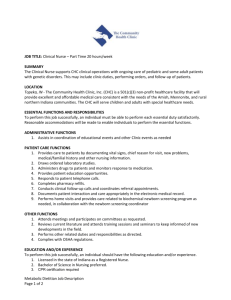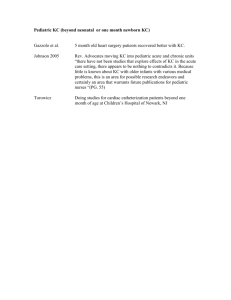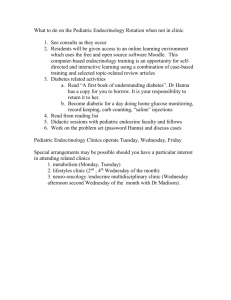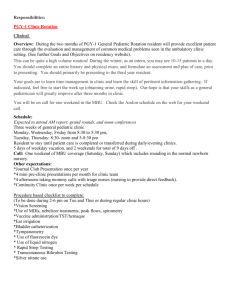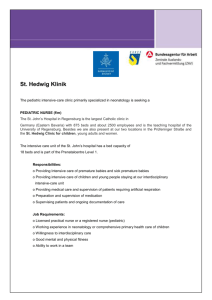Wingshan Lo
advertisement
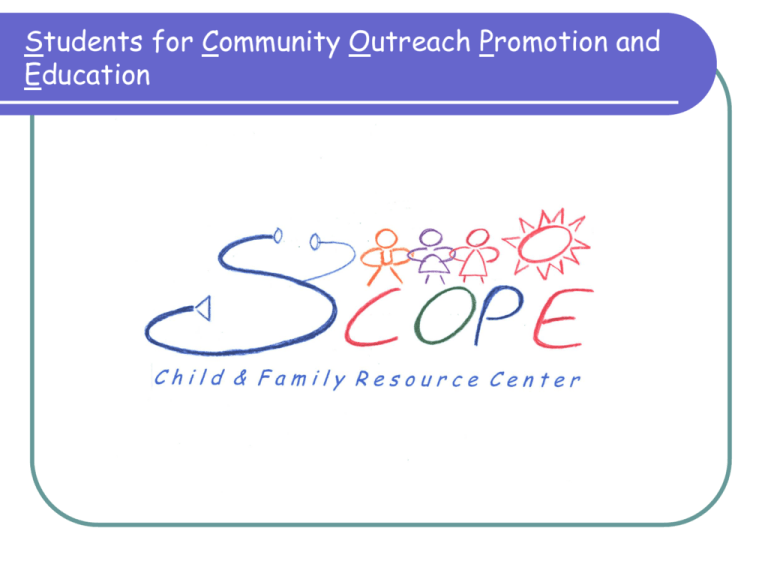
Students for Community Outreach Promotion and Education SCOPE SCOPE City MatCH Expedition Conference 2004 September 13, 2004 Wingshan Lo Research Associate Sponsored by: Advisors: Alice Kuo, MD, PhD, MEd Todd Franke, PhD UCLA CHAT UCLA Center for Healthier Children, Families and Communities What is SCOPE? A children and family resource desk in the waiting room of the UCLA pediatric clinic. A repository of health and social resources easily accessible by patients, their families, physicians and medical staff. How did SCOPE come about? It is well known that a connection exists between a child’s environment and his/her health.** To improve the health and well-being of children, parents and families must have access to social and community services. Pediatric residents identified need for centralized center of information and resources for the families of their patients. In response to need, medical, graduate and undergraduate students established SCOPE Child and Family Resource Center at UCLA in July 2003. **Inkelas M, Halfon N, Uyeda K, et al. The Health of Young Children in California, findings from the 2001 California Health Interview Survey 2003. Demographics UCLA Children’s Health Center (CHC) Continuity Clinic: 8,000 – 10,000 patient visits per year at the Continuity Clinic (~ 23,000 total visits per year at CHC) Most patients live in Los Angeles county; however, 3% come from out of state Insurance Status: 90% Medicaid 8% Private insurance 2% Self-pay Demographics UCLA Children’s Health Center (CHC) Residents’ Primary Care Clinic: 70-75% Hispanic 10% Asian 10% Caucasian 5% African American Demographics Languages Spoken at CHC: 50% Speak only Spanish 25% Speak English and Spanish 10% Speak Asian or Middle Eastern languages SCOPE’s Objectives 1. To implement a comprehensive system to deliver health, social services and community information for the children and families of the pediatric clinic. 2. To develop a curriculum to teach physicians and medical staff about community resources. What type of information does SCOPE provide? After school activities Dental Health Affordable day care Domestic Violence Drug and Alcohol abuse Education and Tutoring Employment and Job Training Food and Nutrition Health Insurance Regional Centers for developmental disabilities Housing/Shelters Immigration/Undocumented Services Library/Literacy Mental Health Parenting Safety Transportation Vision Health Weight Reduction Programs And others How volunteers address needs Volunteers are educated and become knowledgeable about SCOPE resources. Every SCOPE client must complete an Intake Form, noting and finding information requested. Information requested is immediately given to the client or mailed if forget to pick it up. Clients are followed-up by volunteers to see if they used resources and to see how things are going. SCOPE results From July 2003 to June 2004, total 502 families requested resources from SCOPE. Most requested resources from SCOPE are: 13% Food/Nutrition 12% Dental Health 10% Day Care/After School Activities Least requested resource from SCOPE overall is Domestic Disputes/Child Abuse (< 1%) Location of Clients requesting SCOPE resources at UCLA: 80% from Los Angeles County 18% from surrounding counties (Kern, Orange County, Riverside, San Bernardino, San Diego, Santa Barbara, Tulare, Ventura) 2% from Outside of California Pediatric resident responses to SCOPE survey How often in the last year have you asked about the following? Often to Always asked about: School problems/IEPs/Special Education Day care/After school activities Never to Sometimes asked about: Availability of food/food stamps Legal/Immigration problems Divorce/Custody issue Domestic Disputes/Child Abuse Pediatric resident responses to SCOPE survey If a Resource Center in the clinic waiting room is available: 50%* believe will help personal time management 85.7%* believe will improve overall quality of clinic patient care. 85.7%* believe will improve overall wellbeing of clinic patients and families. * (Rating of Moderately to Extremely) Pediatric resident responses to SCOPE survey Overall… It would reduce their level of stress and improve their sense of effectiveness in the clinic. Conclusions Although pediatric residents are skilled at handling medical problems of children, they may not be confident enough to provide other valuable community resources that could impact a child’s health. SCOPE has proven to be valuable in bridging the gap between pediatric residents’ delivery of medical care and lack of knowledge of social/community resources. Next Steps Continue physician and medical staff education about SCOPE. New Intake Form New Follow-up Form Expand SCOPE into the community, as well as its range of resources, where we plan to focus on physical fitness and nutrition resources for children and families.
